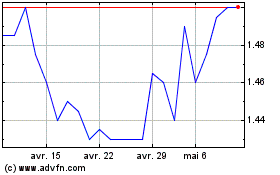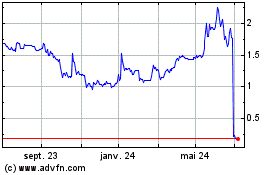- A recent publication evidences that SARS-CoV-2 infection, even
when unnoticed or asymptomatic, in psychotic patients can have an
influence on the activation of the W-ENV protein (Human Endogenous
Retrovirus W), in a context of innate immune inflammation.
- Co-clustering of elevated antibody titers against SARS-CoV-2
nucleocapsid with W-ENV in serum and high levels of
pro-inflammatory cytokines characterizes this subtype of psychotic
disorders.
- This study highlights the urgent need for the development of
new methods and therapeutic approaches for the treatment of
psychotic patients who may be suffering from the deleterious
effects of the W-ENV protein, when activated or boosted by
environmental viruses in genetically susceptible individuals.
- The study has been published in “Translational Psychiatry”, a
Nature Publishing Group journal of reference, resulting from a
collaboration between GeNeuro’s research team, the
immuno-psychiatry team of the Hôpital Mondor in Créteil/Paris, and
the I2MC platform The article is available for consultation at the
following link: https://doi.org/10.1038/s41398-023-02575-3
(Patients with psychosis spectrum disorders hospitalized during the
COVID-19 pandemic unravel overlooked SARS-CoV-2 past infection
clustering with HERV-W ENV expression and chronic
inflammation)
Regulatory News:
GeNeuro (Euronext Paris: CH0308403085 - GNRO), a
biopharmaceutical company developing treatments for
neurodegenerative and autoimmune diseases, such as multiple
sclerosis (MS), amyotrophic lateral sclerosis (ALS) and the severe
neuro-cognitive consequences of COVID-19 (post-COVID or
Long-COVID), today announced, in collaboration with Professor
Marion Leboyer from the FondaMental Foundation, and Dr Ryad
Tamouza, head immunologist for the immuno-psychiatry team, the
publication in the leading scientific publication Translational
Psychiatry of a new study showing that over 80% of the patients
hospitalized in a psychiatry department near Paris during the first
wave of the COVID-19 pandemic had been exposed to SARS-CoV-2, i.e.,
1.6 times more than for the control group.
27% of patients with non-vaccinal SARS-COV-2 positive serology
corresponded to the previously described psychotic disorder
subgroup associating HERV-W expression1. These results are
confronted to those of a recent study has shown showing that the
SARS-CoV-2 virus causing COVID-19 can trigger the activation of the
HERV-W retrovirus, which may result in post-infectious syndromes or
diseases associated with persistent HERV-W ENV expression in
genetically predisposed individuals 2.
Several specific factors explaining asymptomatic or unrecorded
COVID-19 in these in-patients, hospitalized in the Psychiatry
Department of the Créteil-Paris VII university hospital in France
have also been suggested.
The authors conclude that this now well defined subgroup of
“inflammatory psychoses” calls for the development of a
differential therapeutic approach in psychoses and more
specifically through the identification and development of further
HERV-related precision medicine therapies.
Preliminary results of this study were presented in 2022 at the
Schizophrenia International Research Society (SIRS) Conference, in
Florence, Italy, in the dedicated session on HERVs and psychoses
chaired by Prof. Robert Yolken (Johns Hopkins University,
Baltimore, USA).
“Our study shows a dominant prevalence of unnoticed SARS-CoV-2
infection in patients hospitalized in our psychiatric department
during the first wave of the COVID-19 pandemic. This is found to be
associated with psychotic patients presenting both
immunoinflammation and W-ENV protein expression, a subgroup that we
had characterized in a previous pre-pandemic study,” said Dr.
Ryad Tamouza, Head immunologist for the immuno-psychatry team
at the Mondor Hospital (Université Paris Est Créteil) in Paris,
and lead author of the publication.
“The results strongly advocate for a precision medicine strategy
targeting this W-ENV protein in these patients with post-infectious
and immunoinflammatory profiles,” added Prof. Marion Leboyer,
Director of the Department of Psychiatry at Henri Mondor University
Hospitals (Université Paris Est Créteil) and Director of the
FondaMental Foundation.
GeNeuro has initiated a program with its main therapeutic asset,
temelimab (an antiobody targeting HERV-W ENV), in Long-COVID for
patients with persistent neurological and neurocognitive symptoms.
The company launched at the end of 2022 a Phase 2 trial, called
GNC-501, that is evaluating the clinical efficacy of a six-month
treatment with temelimab on the improvement of cognitive impairment
and/or fatigue in Long-COVID patients who are positive for the
presence of W-ENV protein in their blood.
The first months of the trial have already confirmed that the
W-ENV protein is present in the blood of over 25% of patients with
persistent syndromes who suffered from Long COVID. Positive results
from this ongoing clinical trial could offer a therapeutic solution
through a personalized medicine approach to a large and well
identified subset of millions of patients affected by
Long-COVID.
“This study paves the way to the biomarker identification of
patients’ subgroups within a clinically defined nosological entity,
who can be efficiently treated with a relevant and targeted
therapeutic approach. With this a precision medicine approach,
GeNeuro is bringing a real innovation in the treatment of
Long-COVID with an ongoing phase II clinical trial,” declared
Dr. Hervé Perron, Chief Scientific Officer of GeNeuro.
About GeNeuro
GeNeuro's mission is to develop safe and effective treatments
for neurological disorders and autoimmune diseases, such as
multiple sclerosis, by neutralizing the causative factors encoded
by HERVs, which represent 8% of human DNA.
GeNeuro is headquartered in Geneva, Switzerland, and has R&D
facilities in Lyon, France. It has rights to 18 patent families
protecting its technology.
For more information, please visit: www.geneuro.com
About the FondaMental Foundation
The FondaMental Foundation is a scientific cooperation
foundation dedicated to improving the diagnosis, understanding and
treatment of mental illness, based at the Albert Chenevier
Hospital, Créteil (France).
The FondaMental Foundation combines care and cutting-edge
research to promote personalized, multidisciplinary patient care,
and to support research and innovation to improve diagnostic and
therapeutic strategies for mental illness.
It may receive donations and legacies.
For more information, please visit:
www.fondation-fondamental.org
Disclaimer
This press release contains certain forward-looking statements
and estimates about GeNeuro's future financial condition, results
of operations, strategy, plans and performance and the markets in
which it operates. These forward-looking statements and estimates
can be identified by words such as "anticipate," "believe," "may,"
"estimate," "expect," "intend," "is designed to," "may," "could,"
"plan," "potential," "predict," "objective," "should," or the
negative of these terms and other similar expressions. They include
all matters that are not historical facts. Forward-looking
statements, forecasts and estimates are based on management's
current assumptions and assessment of known and unknown risks,
uncertainties and other factors that were believed to be reasonable
at the time they were made but may prove to be incorrect. Events
and results are difficult to predict and depend on factors beyond
the Company's control. Consequently, the actual results, financial
condition, performance and/or achievements of GeNeuro or the
industry may differ materially from future results, performance or
achievements expressed or implied by such statements, forecasts and
estimates. Because of these uncertainties, no representation is
made as to the accuracy or correctness of such forward-looking
statements, forecasts and estimates. Furthermore, forward-looking
statements, forecasts and estimates speak only as of the date they
are made, and GeNeuro undertakes no obligation to update or revise
them, whether as a result of new information, future events or
otherwise, except as required by law.
1 Tamouza, R., U. Meyer, A. Lucas, J.R. Richard, I. Nkam, A.
Pinot, N. Djonouma, W. Boukouaci, B. Charvet, J. Pierquin, J.
Brunel, S. Fourati, C. Rodriguez, C. Barau, P. Le Corvoisier, K. El
Abdellati, L. De Picker, H. Perron, and M. Leboyer. 2023. Patients
with psychosis spectrum disorders hospitalized during the COVID-19
pandemic unravel overlooked SARS-CoV-2 past infection clustering
with HERV-W ENV expression and chronic inflammation. Transl
Psychiatry 13:272.
2 Charvet, B., J. Brunel, J. Pierquin, M. Iampietro, D. Decimo,
N. Queruel, A. Lucas, M.D.M. Encabo-Berzosa, I. Arenaz, T.P.
Marmolejo, A.I. Gonzalez, A.C. Maldonado, C. Mathieu, P. Kury, J.
Flores-Rivera, F. Torres-Ruiz, S. Avila-Rios, G. Salgado Montes de
Oca, J. 2 Schoorlemmer, H. Perron, and B. Horvat. 2023. SARS-CoV-2
awakens ancient retroviral genes and the expression of
proinflammatory HERV-W envelope protein in COVID-19 patients.
iScience 26:106604.
View source
version on businesswire.com: https://www.businesswire.com/news/home/20230910756138/en/
GeNeuro Jesús Martin-Garcia President and CEO +41 22 552
4800 investors@geneuro.com
NewCap (France) Mathilde Bohin / Louis-Victor Delouvrier
(investors) +33 1 44 71 98 52 Arthur Rouillé (media) +33 1 44 71 94
98 geneuro@newcap.eu
GeNeuro (EU:GNRO)
Graphique Historique de l'Action
De Mar 2024 à Avr 2024

GeNeuro (EU:GNRO)
Graphique Historique de l'Action
De Avr 2023 à Avr 2024
